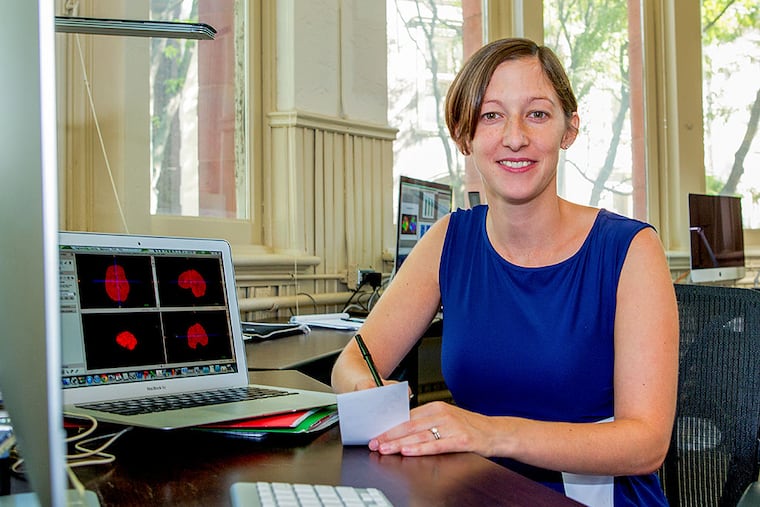Penn researcher Danielle Bassett wins a 'genius grant'
"Are you sure you have the right person?" Danielle S. Bassett asked. The University of Pennsylvania brain researcher is just 32, one year into her first faculty position. So when the MacArthur Foundation people called her last week, Bassett figured they were planning to award one of their coveted $625,000 grants to an older colleague, and wanted to ask her opinion.

"Are you sure you have the right person?" Danielle S. Bassett asked.
The University of Pennsylvania brain researcher is just 32, one year into her first faculty position. So when the MacArthur Foundation people called her last week, Bassett figured they were planning to award one of their coveted $625,000 grants to an older colleague, and wanted to ask her opinion.
No, they wanted Bassett.
The foundation named her and 20 others Wednesday as the winners of its annual fellowships, informally dubbed the "genius grants" by the media in 1981, the first year they were awarded.
The winners include artists, scientists, historians, and lawyers, recognized not for genius in the sense of raw performance on an IQ test, but for creativity and originality of thought. An anonymous pool of nominators picks several hundred candidates each year, and a small committee typically selects 20 to 30 winners based on both their past achievements and their promise of future success.
The winners generally have no inkling they are under consideration. The money, doled out over five years, comes with no strings attached.
"I'm still processing that this is actually happening," said Bassett, the youngest of this year's fellows.
Also among the winners are graphic memoirist and cartoonist Alison Bechdel, who grew up in Lock Haven; jazz composer and saxophonist Steve Coleman, of Allentown; and University of Pittsburgh writing professor and poet Terrance Hayes. Tara Zahra, a 1998 graduate of Swarthmore College, was honored for her work as a historian of modern Europe.
In a group being honored for creative brains, it makes sense that one, Bassett, studies the very quality that makes brains flexible.
An assistant professor of bioengineering at Penn, she applies a discipline called network science to the study of how we learn. She and colleagues indirectly measure the brain activity of research subjects with a type of MRI machine, monitoring how different regions of the brain interact as people learn.
Those with flexible brains - meaning they are adept at trying various strategies and forging connections - seem to be the best at acquiring new knowledge, she said. This agility can be seen on brain scans as they learn a task such as tapping a sequence of keys on a keyboard, she said.
The daughter of an artist and surgeon, Bassett uses a dance metaphor to describe the phenomenon of watching connections form between regions of the brain, each one 1 to 3 centimeters across.
"You might dance with one partner for a while, and after a while you're going to switch and dance with a different partner," she said. "That's kind of the way brain regions work as well. You can actually watch these switches happen."
People whose brains can make lots of switches seem to be better learners, though the kinds of switches appear as important as the number, she said. The goal is to use the brain scans to identify conditions that would help anyone become a better learner, or aid someone rehabbing from a brain injury, she said.
Bassett grew up in Lock Haven and Reading, the second-oldest of 11 children. The kids were home-schooled by their mother, artist Holly Perry, though Bassett said she got her appreciation of medicine from her father, Reading Hospital orthopedic surgeon John Perry.
She spent a year and a half in nursing school before switching to the study of physics at Pennsylvania State University, followed by a Ph.D. at Cambridge.
She is married to Lee Bassett, an assistant professor of electrical and systems engineering at Penn. The couple live in Wallingford with their 3-year-old son and have another baby on the way.
Her husband is not quite sure what to make of the "genius" label, but he thinks the award is about something a bit different.
"There's a lot of smart people in the world," Lee Bassett said. "What I think they're recognizing here is something much more: drive, persistence, and some willingness to take risks.
"She is tackling the problems that very few physicists want to get anywhere near," he said. "She's interested in stuff like how we think and how we feel and how we interact. These are the problems that don't have easy or elegant solutions."
Danielle Bassett has no specific plans for the money, other than to spend it on creative research. In an era of stagnant funding, many scientists fret that they can get support only for the more conservative projects - those theories for which substantial evidence already exists.
So promising but untested ideas may get left on the back burner. Not for Bassett and her fellow winners.
"This just gives you a lot of freedom, which is actually what the MacArthur is about, right?" she said. "It's about creative, self-directed ideas."
215-854-2430